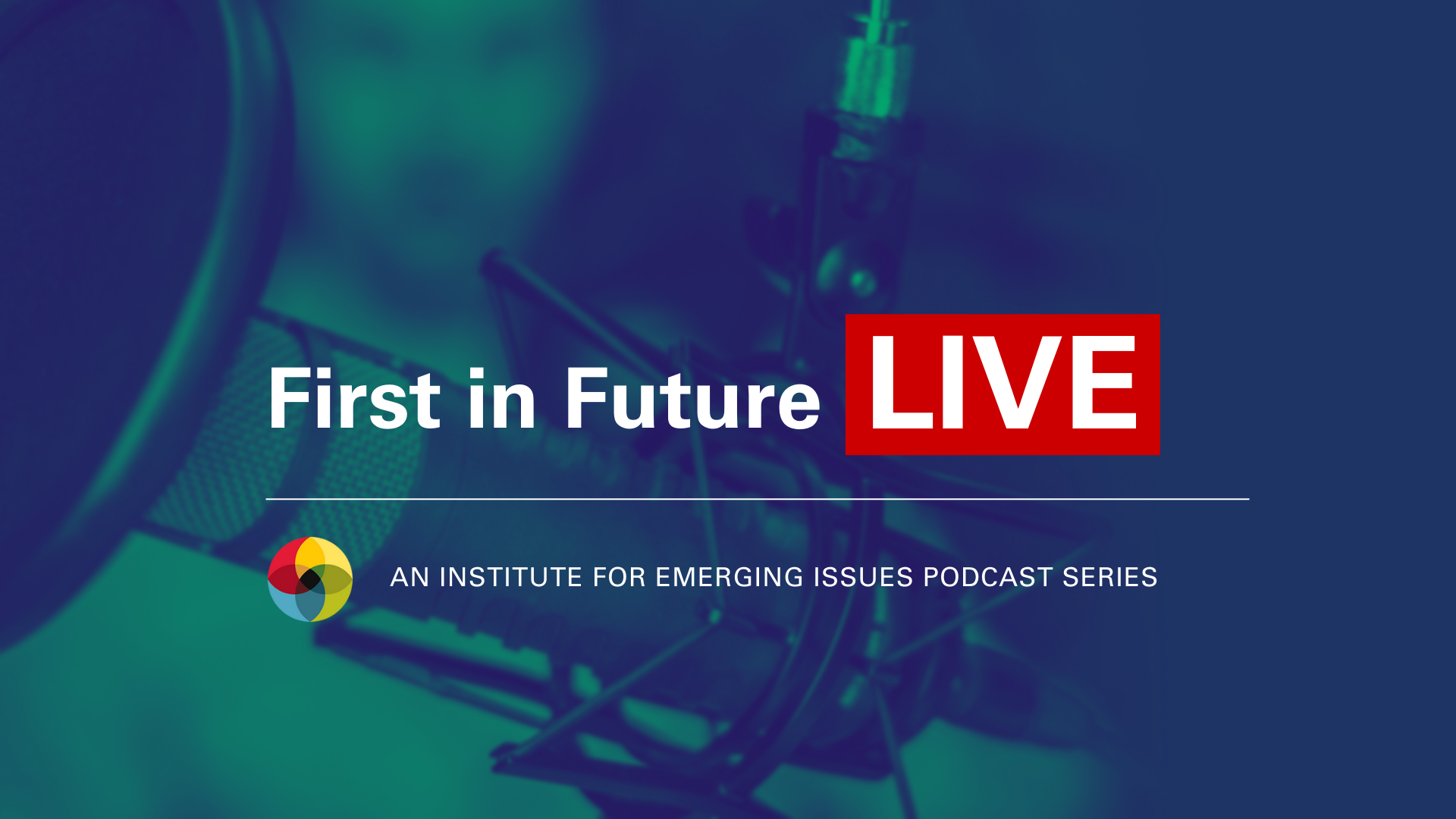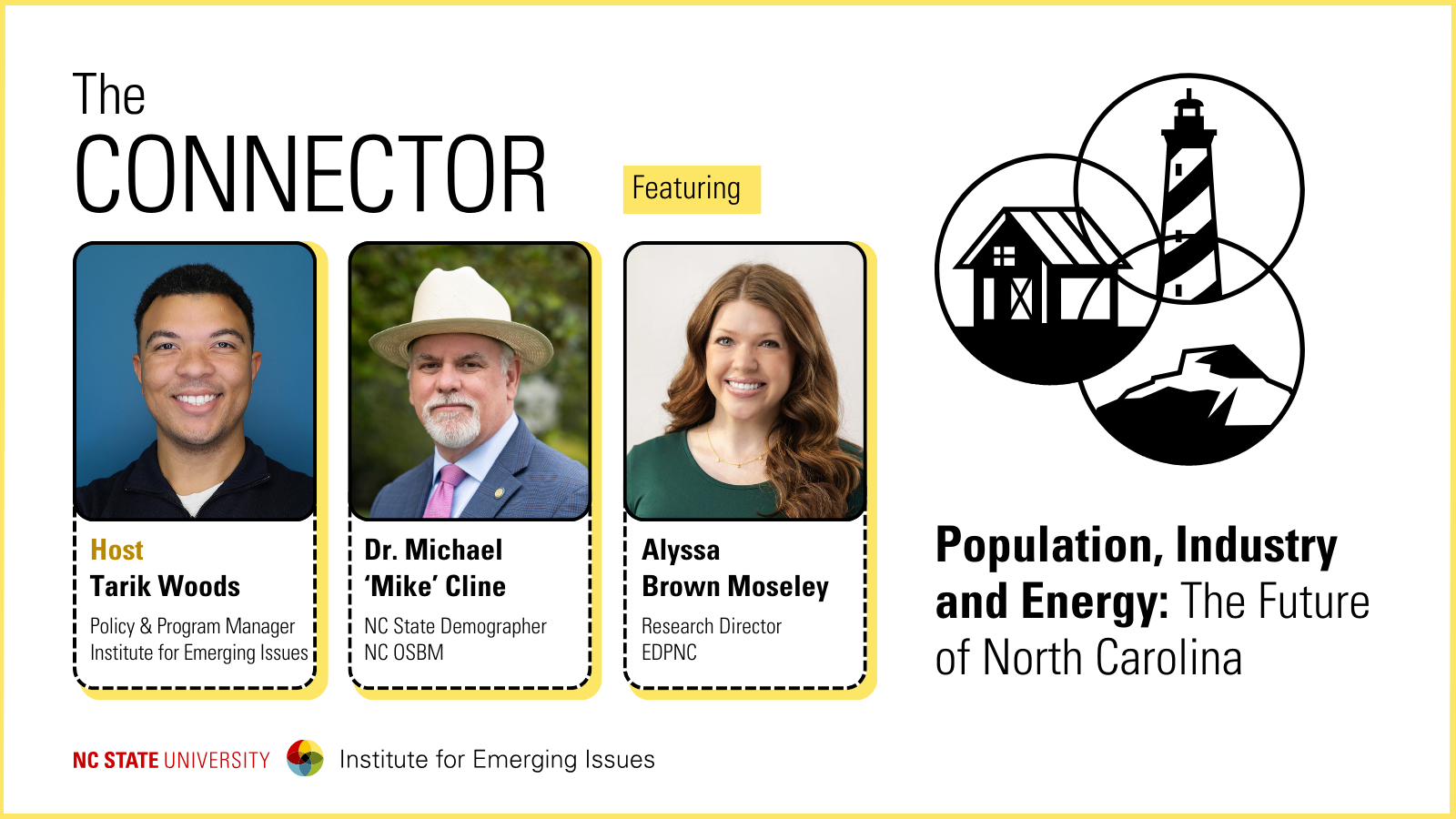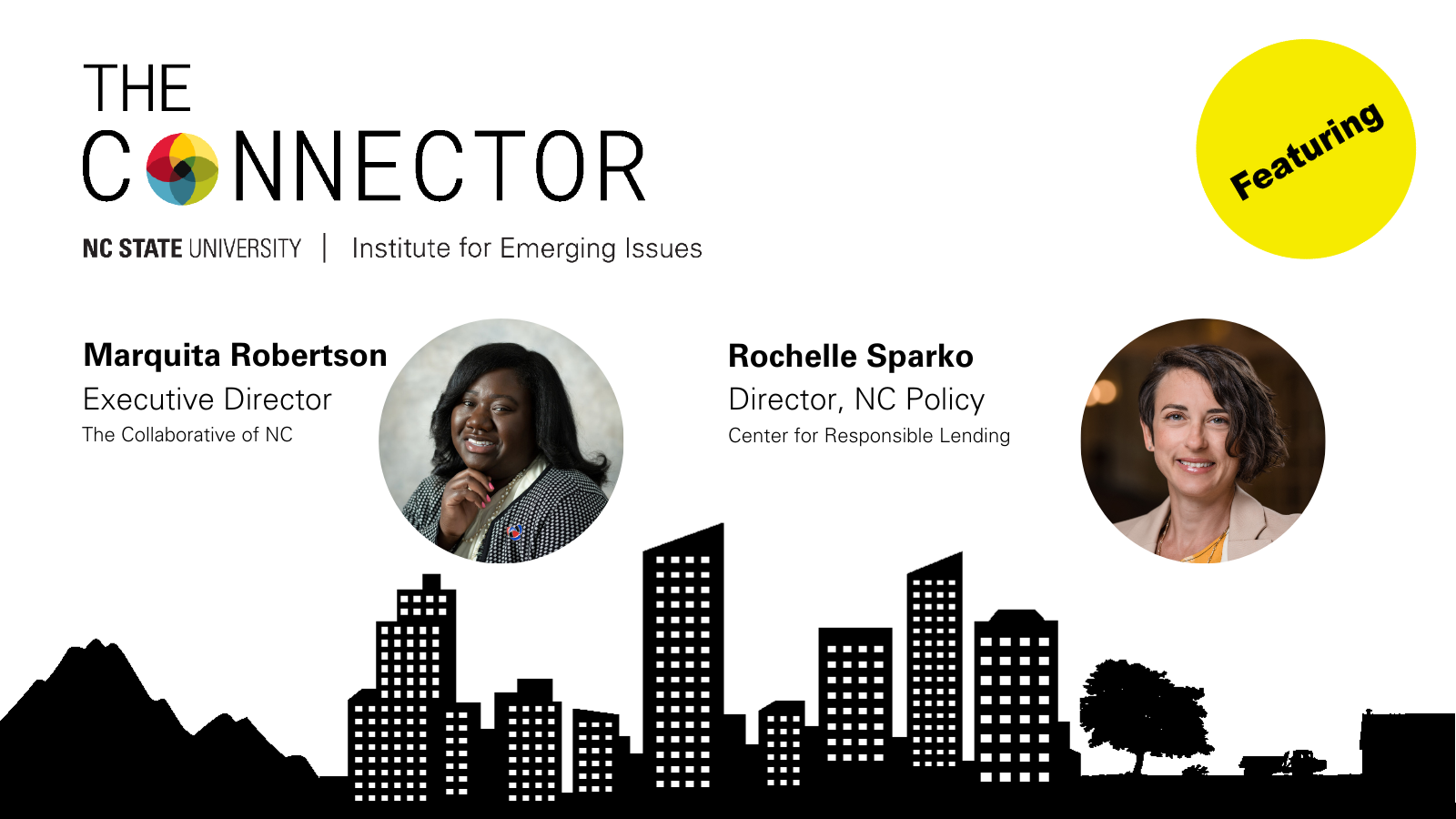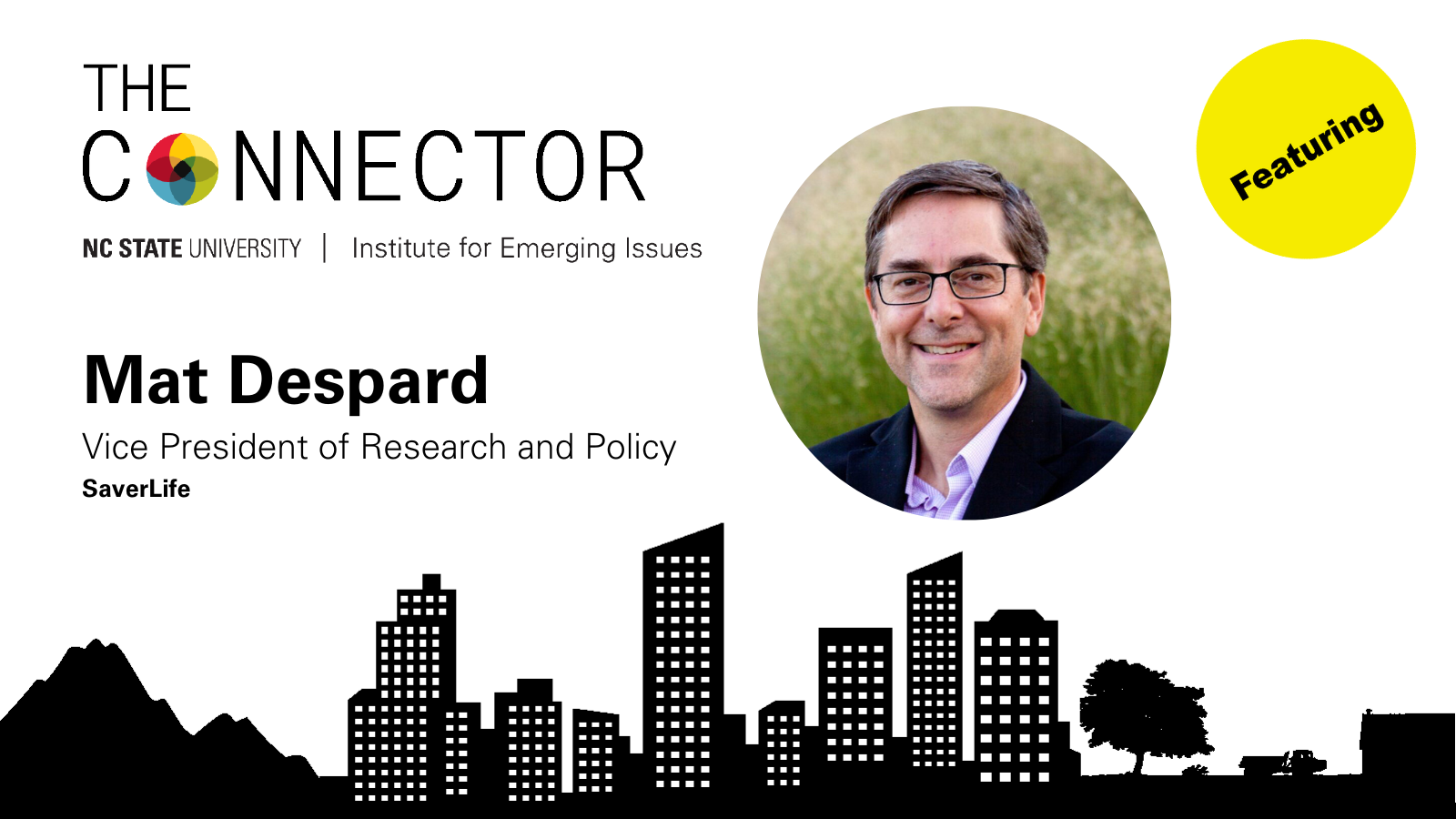From Crisis to Opportunity in Child Care

Summary: The Institute for Emerging Issues is hosting a series of conversations around early childhood learning focused on how we develop stronger systems in the midst of ongoing uncertainty.
This episode (From Crisis to Opportunity in Child Care) with guest host Patrick Cronin (IEI Assistant Director) and guests Sheila Arias (Campaign Associate, MomsRising), Marsha Basloe (President, Child Care Services Association), Rhonda Rivers (Regional Director of Curriculum and Training, LeafSpring Schools – Charlotte), and Sepi Saidi (President/CEO, SEPI, Inc.)
*This episode of First in Future was recorded on Thursday, July 30th, and reflects information that was up-to-date at that time.*
View the slides here.
Watch Zoomcast on YouTube.
Listen to the podcast:
- NC Early Education Coalition
- Child Care Services Association
- MomsRising NC
- BEST-NC, Facts and Figures: Education in NC (2020 edition)
- The National Institute for Early Education Research:
- To propel a successful post-COVID economy, we must rebuild a stronger child care system Sepi Saidi, EducationNC, 7/20/20.
Why should we all care about child care in our state?
Sheila Arias: We should all care because we don’t get to do it over. We don’t get a second chance to get kids ready for school. Critical that children have access to quality early care from birth. Families need affordable, quality care in order to work and support their families.
Rhonda Rivers: Child care is critically important – an opportunity to establish a healthy foundation of learners developing every area of their lives – our early investment in our future workforce. Invest in our youngest citizen so that in 20 years from now, we have a healthy, competent workforce.
Sepi Saidi: I consider child care and child education to be the same thing. Pay attention to those very early years – that shape a human being. Investment in early years will ensure adults who will lead us into the future. Also women’s ability to have careers – especially during the pandemic, we don’t want to lose talented professional women.
Marsha Basloe: 2-generation model takes care of children to grow the next generation and helps working parents so they can be productive. You can’t build a house without the foundation. Early childhood is the foundation. And you can’t live and operate without that strong foundation.
What’s been the impact of the pandemic on your family and families you know?
Sheila Arias: We can all relate to the fact that it comes down to child care. I’m caring for my niece, who has a single mom, and who has been on a waiting list to get into child care. It’s challenging – working from home and taking care of 2 kids and niece. Talking to other families, they share similar experiences. Moms have quit their jobs so they can stay at home and take care of their children because they have nowhere else to take them.
Sister is an essential worker – we can help her, but what about families who don’t have second options?
How has the pandemic affected your child care operations?
Rhonda Rivers: Similar struggles – a challenge in so many ways. Number one focus is keeping children & workforce safe. Child care workers have added new meaning to essential during the pandemic. Our teachers – a lot of moms – risk their lives and health every day to come and provide children with nurturing. They do it because we provide them the safest situation possible. If they’re not there, other essential employees can’t work. We must stay open to get our state open.
What child care issues have you and your employees been dealing with during the pandemic?
Sepi Saidi: Heard from staff in my office who have small children that say they had no idea what a difficult job it is to teach. Key has been flexibility – working with employees in a hybrid work environment/flexible hours to achieve their goals.
Similar stories from other business owners?
Sepi Saidi: Yes – and the value of teachers has become magnified. Important for us as a state to invest into teachers and early childhood education and pre-K.
Are these typical stories?
Marsha Basloe: Hearing this across the state. Flexibility in business is needed to be successful. For years, focus was on policies to expand access. Paid almost no attention to supply side, helping child care providers with money to pay teachers. Have to make a difference in pay.
What was the impact from a child care provider perspective?
Marsha Basloe: At about 52-57% occupancy rate for child care centers now. To survive as an industry, can’t get by at that rate. “We need to make sure that the child care programs survive so that when our economy opens up again, we have child care for everyone.”
Did the pandemic expose existing weaknesses in the child care system?
Marsha Basloe: Child care industry has always been fragile because focus was on getting parents affordable child care, didn’t focus on supply side. Need qualified educators that we can pay well. Child care programs are small businesses – have rent/mortgage, payroll, etc. Need to invest in that small business.
Business model challenge – it’s expensive as a parent to send a child to child care. Yet people aren’t getting rich working in child care.
Rhonda Rivers: Important that we don’t undervalue or understate the value – of teachers providing a safe environment and quality learning foundation. It’s expensive to operate. It’s important for teachers to make livable wages so they can afford health care. In NC, many teachers don’t have benefits they need. Parents make sacrifices to afford quality child care – so we are diligent about funds – putting it back into programs/teachers.
Describe a child care system that meets your needs.
Sepi Saidi: Child care – from age 0 to 18 – as a state, need to look at a comprehensive plan. Major commitment from state and business community – work together to create affordable, reliable, safe child care system for all, especially in low-income areas. “We are all connected together, families, workforce—it’s a continuous impact. So we have to think comprehensively.”
Sheila Arias: Child care that respects cultures and languages that families need – we’re diverse in this state. Consideration that teachers are humans – consider their pay and health. Investment at state and federal levels – for lawmakers to see importance of early child care. Families will thrive, kids will have better futures – meaning better economy for all.
Rhonda Rivers: Agree with Marsha – child care is the workforce behind the workforce. How do we support and keep a thriving workforce? Who needs to be at the table for those conversations? Representatives hear voices of teachers. Workforce has to be in a safe environment, with living wages and benefits/insurance. Can’t get the state back to work if parents don’t feel comfortable with where they leave their children. Have to put funds/support behind child care workforce.
Marsha Basloe: NC has made investment in teachers – 2 programs – childcare wages salary supplement program and infant toddler educator awards. Helped reduce turnover rate. Worry about supply of early childhood teachers – need to work with higher ed community to ensure programs for teachers.
Where do we go from here?
Sepi Saidi: Combined public-private partnership. Look at priorities of investments – public facilities spend money on sports, parking – could be creatively managed, used for other needs. Opportunities to brainstorm/be creative with resources. Make child care and education a priority.
- Categories:


